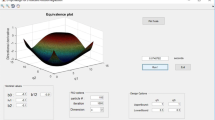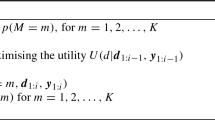Abstract
Stochastic process models are now commonly used to analyse complex biological, ecological and industrial systems. Increasingly there is a need to deliver accurate estimates of model parameters and assess model fit by optimizing the timing of measurement of these processes. Standard methods to construct Bayes optimal designs, such the well known Müller algorithm, are computationally intensive even for relatively simple models. A key issue is that, in determining the merit of a design, the utility function typically requires summaries of many parameter posterior distributions, each determined via a computer-intensive scheme such as MCMC. This paper describes a fast and computationally efficient scheme to determine optimal designs for stochastic process models. The algorithm compares favourably with other methods for determining optimal designs and can require up to an order of magnitude fewer utility function evaluations for the same accuracy in the optimal design solution. It benefits from being embarrassingly parallel and is ideal for running on multi-core computers. The method is illustrated by determining different sized optimal designs for three problems of increasing complexity.









Similar content being viewed by others
References
Amzal, B., Bois, F.Y., Parent, E., Robert, C.P.: Bayesian-optimal design via interacting particle systems. J. Am. Stat. Assoc. 101, 773–785 (2006)
Baggaley, A.W., Boys, R.J., Golightly, A., Sarson, G.R., Shukurov, A.: Inference for population dynamics in the neolithic period. Ann. Appl. Stat. 6(4), 1352–1376 (2012)
Cook, A.R., Gibson, G.J., Gilligan, C.A.: Optimal observation times in experimental epidemic processes. Biometrics 64(3), 860–868 (2008)
Drovandi, C.C., Pettitt, A.N.: Bayesian experimental design for models with intractable likelihoods. Biometrics 69(4), 937–948 (2013)
Galassi, M., Davies, J., Theiler, J., Gough, B., Jungman, G., Alken, P., Booth, M., Rossi, F.: GNU scientific library, 3rd edn. Network Theory Ltd (2002)
Gillespie, C.S., Golightly, A.: Bayesian inference for generalized stochastic population growth models with application to aphids. J. R. Stat. Soc. Ser. C 59(2), 341–357 (2010)
Henderson, D.A., Boys, R.J., Krishnan, K.J., Lawless, C., Wilkinson, D.J.: Bayesian emulation and calibration of a stochastic computer model of mitochondrial DNA deletions in substantia nigra neurons. J. Am. Stat. Assoc. 104(485), 76–87 (2009)
Khatab, A., Aghezzaf, E.H., Diallo, C., Djelloul, I.: Selective maintenance optimisation for series–parallel systems alternating missions and scheduled breaks with stochastic durations. Int. J. Prod. Res. 55(10), 3008–3024 (2017)
Matis, J.H., Kiffe, T.R., Matis, T.I., Stevenson, D.E.: Stochastic modeling of aphid population growth with nonlinear, power-law dynamics. Math. Biosci. 208(2), 469–494 (2007)
Matis, T.I., Parajulee, M.N., Matis, J.H., Shrestha, R.B.: A mechanistic model based analysis of cotton aphid population dynamics data. Agric. For. Entomol. 10(4), 355–362 (2008)
Müller, P.: Simulation-based optimal design. In: Bayesian Statistics 6: Proceedings of Sixth Valencia International Meeting, vol. 6, p. 459. Oxford University Press (1999)
Overstall, A.M., McGree, J.M., Drovandi, C.C.: An approach for finding fully Bayesian optimal designs using normal-based approximations to loss functions. Stat. Comput. 28(2), 343–358 (2018)
Overstall, A.M., Woods, D.C.: Bayesian design of experiments using approximate coordinate exchange. Technometrics 59(4), 458–470 (2017)
Overstall, A.M., Woods, D.C., Adamou, M.: acebayes: optimal Bayesian experimental design using the ACE algorithm. R Package Version 1(4), 1 (2017)
Price, D.J., Bean, N.G., Ross, J.V., Tuke, J.: An induced natural selection heuristic for finding optimal Bayesian experimental designs. Comput. Stat. Data Anal. 126, 112–124 (2018)
Ryan, E.G., Drovandi, C.C., Pettitt, A.N.: Fully Bayesian experimental design for pharmacokinetic studies. Entropy 17(3), 1063–1089 (2015)
Author information
Authors and Affiliations
Corresponding author
Additional information
Publisher's Note
Springer Nature remains neutral with regard to jurisdictional claims in published maps and institutional affiliations.
Rights and permissions
About this article
Cite this article
Gillespie, C.S., Boys, R.J. Efficient construction of Bayes optimal designs for stochastic process models. Stat Comput 29, 697–706 (2019). https://doi.org/10.1007/s11222-018-9833-3
Received:
Accepted:
Published:
Issue Date:
DOI: https://doi.org/10.1007/s11222-018-9833-3




